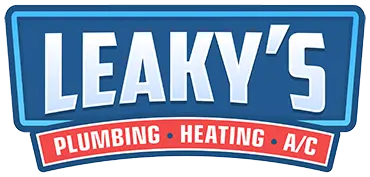Water Heater FAQs

Common Water Heater FAQs in Lubbock & San Antonio, TX
At Leaky’s Plumbing, Heating & A/C, we understand that water heater issues can be both inconvenient and confusing. As a trusted plumbing company in Lubbock, TX, we want to make sure you have all the information you need to keep your water heater running smoothly. Below, we've compiled answers to the top 15 most frequently asked questions about water heaters. Whether you're dealing with a sudden breakdown or just want to learn more about maintaining your system, we've got you covered.
1. How long does a water heater last in Lubbock, TX?
On average, a traditional water heater can last between 10 to 15 years in Lubbock, TX. However, this lifespan can vary depending on factors such as the quality of the unit, the hardness of your water, and how well it's maintained. Regular maintenance, such as flushing the tank to remove sediment buildup, can extend the life of your water heater. If your unit is over 10 years old and you're experiencing frequent issues, it may be time to start considering a replacement. For more guidance, you can always consult with our team at Leaky’s Plumbing for an inspection.
2. Why is my water heater not producing hot water?
Several issues can cause your water heater to stop producing hot water. The most common reasons include a tripped circuit breaker, a faulty thermostat, a broken heating element (for electric heaters), or a gas supply issue (for gas heaters). If your water heater is running but not heating properly, it’s important to have it inspected by a professional to pinpoint the exact cause. At Leaky’s Plumbing, we offer expert diagnostics and repairs for all types of water heaters.
3. What size water heater do I need for my home in Lubbock?
The size of your water heater depends on your household's hot water demand. Typically, a 40-50 gallon water heater is sufficient for most households in Lubbock. However, larger families or homes with higher water usage may require a 60-80 gallon tank. To determine the best size for your home, consider the number of people living in the household and the number of bathrooms. Our experts at Leaky’s Plumbing can help you choose the right size and model to ensure your home has enough hot water without wasting energy.
4. Should I repair or replace my water heater?
Whether to repair or replace your water heater depends on several factors, including the age of the unit, the extent of the damage, and the cost of repair. If your water heater is more than 10 years old and needs frequent repairs, replacing it with a newer, more energy-efficient model is often the best option. However, if the issue is minor and the water heater is relatively new, a repair may be more cost-effective. At Leaky’s Plumbing, we provide honest advice on whether repair or replacement is the right choice for your water heater.
5. How often should I flush my water heater?
Flushing your water heater once a year is recommended to remove sediment buildup that can reduce efficiency and cause damage over time. In areas like Lubbock, where hard water is common, flushing the tank is especially important to prevent mineral deposits from accumulating. Flushing helps maintain the efficiency of your water heater, ensuring it heats water effectively and extends its lifespan. Leaky’s Plumbing can handle this task for you and ensure your water heater is properly maintained.
6. Why is my water heater making a popping or rumbling noise?
Hearing strange noises from your water heater, such as popping or rumbling, typically indicates that there is sediment buildup at the bottom of the tank. As the heater heats up, water gets trapped beneath the sediment, causing it to boil and produce noise. This can also lead to decreased efficiency and overheating. Flushing the tank usually resolves this issue. If the noise persists, it may be a sign of more serious damage, and you should contact Leaky’s Plumbing for a professional inspection.
7. What is the best temperature setting for my water heater?
The ideal temperature for your water heater is 120°F. This setting provides plenty of hot water for daily needs while also preventing scalding and reducing energy consumption. Setting your water heater higher than this can lead to increased energy costs and may even cause damage to your plumbing. At Leaky’s Plumbing, we can adjust the thermostat on your water heater to ensure optimal performance and energy efficiency.
8. What causes water heater leaks?
Leaks in a water heater can be caused by a variety of issues, including a corroded tank, a loose connection, or a faulty valve. Over time, the tank itself can deteriorate due to sediment buildup or rust, leading to leaks. If you notice water pooling around your water heater, it’s important to shut off the power and water supply immediately and call a professional plumber. Leaky’s Plumbing can quickly identify the source of the leak and provide the necessary repair or replacement.
9. How do I know if my water heater needs to be replaced?
There are several signs that your water heater may need replacement, including inconsistent water temperature, frequent repairs, unusual noises, or visible leaks. If your water heater is over 10 years old and showing these signs, it’s likely time for a replacement. Another factor to consider is energy efficiency—if your unit is outdated, replacing it with a more energy-efficient model can save you money in the long run. Our experts at Leaky’s Plumbing can assess your unit and help you make an informed decision.
10. Can I install a water heater myself?
While it may be tempting to try installing a water heater on your own, it’s not recommended unless you have the proper experience and knowledge. Installing a water heater requires knowledge of plumbing, electrical, and gas systems. Improper installation can result in water damage, gas leaks, or even personal injury. It’s always best to trust a professional plumber, like the team at Leaky’s Plumbing, to handle your water heater installation safely and correctly.
11. How can I make my water heater more energy efficient?
There are several ways to improve the energy efficiency of your water heater, such as lowering the thermostat to 120°F, insulating your tank and pipes, and scheduling regular maintenance. Additionally, replacing an old water heater with a high-efficiency model can lead to significant energy savings. Tankless water heaters, for example, provide hot water on demand without the need for a storage tank. Our team at Leaky’s Plumbing can help you choose the most energy-efficient solution for your home.
12. What is a tankless water heater?
A tankless water heater, also known as an on-demand water heater, heats water directly without the need for a storage tank. This type of water heater is energy-efficient because it only heats water when it’s needed, reducing standby energy loss. Tankless water heaters are ideal for homeowners who want to save space and reduce energy costs. If you’re interested in upgrading to a tankless system, Leaky’s Plumbing can help you determine if it’s the right option for your home.
12. What is a tankless water heater?A tankless water heater, also known as an on-demand water heater, heats water directly without the need for a storage tank. This type of water heater is energy-efficient because it only heats water when it’s needed, reducing standby energy loss. Tankless water heaters are ideal for homeowners who want to save space and reduce energy costs. If you’re interested in upgrading to a tankless system, Leaky’s Plumbing can help you determine if it’s the right option for your home.
13. How much does it cost to replace a water heater in Lubbock, TX?
The cost of replacing a water heater in Lubbock can vary depending on factors like the type of water heater (tank or tankless), the size of the unit, and installation requirements. On average, homeowners can expect to pay anywhere from $800 to $2,500 for a new water heater, including installation. At Leaky’s Plumbing, we provide transparent pricing and can help you find a water heater that fits your budget and needs.
14. Why is my hot water running out too quickly?
If your hot water is running out too quickly, it may be due to a variety of issues. For example, the thermostat may be set too low, the water heater tank may be too small for your household’s needs, or there may be a buildup of sediment that’s affecting the heater’s efficiency. If your water heater is over 10 years old, it may also be struggling to keep up with demand. Contact Leaky’s Plumbing to have your water heater inspected and receive professional recommendations for improving hot water availability.
15. How do I prevent water heater issues in the future?
Regular maintenance is key to preventing water heater issues. Scheduling an annual inspection and flushing the tank every year to remove sediment buildup can help prolong the life of your unit. Additionally, it’s important to monitor your water heater for signs of damage or inefficiency and address any issues promptly. Leaky’s Plumbing offers comprehensive water heater maintenance plans to ensure your system stays in top condition year-round.
Contact Leaky’s Plumbing, Heating & A/C For Answers To All Your Water Heater FAQs
If you have more questions or need assistance with your water heater, don't hesitate to contact Leaky’s Plumbing, Heating & A/C. We are dedicated to providing high-quality plumbing services to homeowners and businesses in Lubbock, TX, and surrounding areas. Whether you need repair, replacement, or routine maintenance, our team of expert plumbers is here to help. Call us today at (806) 454-9688 to schedule a consultation and get the answers you need!
